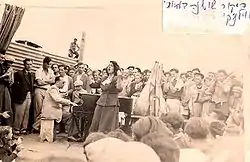Shoshana Damari
Shoshana Damari (Hebrew: שושנה דמארי; March 31, 1923 – February 14, 2006) was a Yemeni-Israeli singer known as the "Queen of Hebrew Music."[1]
Shoshana Damari שושנה דמארי | |
|---|---|
 Damari in 1973 | |
| Background information | |
| Born | March 31, 1923 Dhamar, Yemen |
| Origin | Tel Aviv, Israel |
| Died | February 14, 2006 (aged 82) Tel Aviv, Israel |
| Occupation(s) | Singer, actress |
Biography


Shoshana Damari was born in Dhamar, Yemen, to a Jewish family who immigrated to Mandate Palestine (now Israel) in 1924 and settled in Rishon LeZion.[2]
At a young age, Damari played drums and sang accompaniment for her mother, who performed at family celebrations and gatherings of the Yemenite community in Palestine.[2] At age 14, her first songs were broadcast on the radio.[3] She studied singing and acting at the Shulamit Studio in Tel Aviv, where she met Shlomo Bosmi, the studio manager who became her personal manager. They wed in 1939, when she was only 16.
Musical career

In 1945, Damari joined Li-La-Lo, a revue theater established by impresario Moshe Wallin. The group performed light entertainment and satire as a counterweight to the serious theater of the time.[4] Damari became known for her distinctive husky voice and Yemenite pronunciation. Her first record was released in 1948 and her best-known song Kalaniyot (Anemones), by Moshe Vilenski, dates from that period. She was especially popular among Israeli soldiers, for whom she frequently performed. After the independence of Israel and throughout the late 70s, Damari performed all over the United States, France, England, South Africa, Brazil, Cuba, Mexico, Argentina, Venezuela, Colombia, Canada, Scandinavia and Japan. She was warmly received by the audience at national and international festivals in Israel and abroad, serving as Israel's unofficial cultural ambassador and earning the title of “First lady of Israeli song.”[5]
In the mid-1980s, Damari teamed up with Boaz Sharabi for a duet that brought her back into the limelight. She was awarded the Israel Prize in 1988 for Hebrew song[6] and an ACUM lifetime achievement award in 1995.
In 2005, she recorded two tracks for the Mimaamakim album by Idan Raichel's Project and participated in some of their live performances. The two had been slated to begin another joint project.
She died in Tel Aviv after a brief bout of pneumonia. She died whilst Kalaniyot was sung by her family and friends who had been sitting in vigil during her final few days.[7] She was buried in the Trumpeldor Cemetery in Tel Aviv.[8]
Tribute
On March 31, 2013, Google celebrated her 90th birthday with a Google Doodle.[9]
Film career
- Hill 24 Doesn't Answer
- Be'Ein Moledet
- Hatikvah (1956/1959)
See also
References
- L.A. Times Obituary : Shoshana Damari, 83; Israeli Singer, 'Queen of Hebrew Music'
- Encyclopedia of Jewish Women: Shoshana Damari
- "Heroes - Trailblazers of the Jewish People". Beit Hatfutsot.
- Queen of mamaloshen
- Shoshana Damari. Jewish Women's Archive
- "Israel Prize Recipients 1988 (in Hebrew)". Retrieved October 21, 2015.
- "Singer Shoshana Damari Passes Away". Arutz Sheva. February 14, 2006. Retrieved February 8, 2009.
- Tzur, Shlomit (June 28, 2010). "The world's quietest neighbors". Haaretz. Retrieved April 15, 2013.
- "Shoshana Damari's 90th Birthday". Google. March 31, 2013.
External links
| Wikimedia Commons has media related to Shoshana Damari. |